

Gérard
Assayag

Gérard Assayag is a research director at IRCAM (Institut de Recherche et de Coordination Acoustique/Musique). He is renowned for his pioneering work in music representation, machine learning, and computer-assisted composition, co-creating influential software such as OpenMusic and OMax, which are widely used for composition, analysis, and improvisation. A co-founder of Collegium Musicae and the French Society for Computer Music, Assayag has also contributed to the Sorbonne Institute for Artificial Intelligence and the Journal of Mathematics and Music. His research focuses on symbolic interaction and co-creativity between humans and machines, shaping new paradigms for cyber-human artistic collaboration. He has authored key publications and organised major conferences bridging music, mathematics, and technology.

Marie-Doha
Besancenot

Marie-Doha Besancenot became NATO’s Assistant Secretary General for Public Diplomacy in September 2023. The Public Diplomacy Division (PDD) works to enhance the Alliance’s profile with audiences globally and build support its operations and policies. Under her leadership, the division launched Women vs Disinfo, a series highlighting 20 women dedicated to countering information threats and defending the truth.
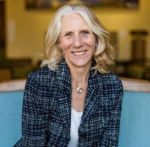
Julia
Black

Julia Black is the President of the British Academy, the national academy for humanities and social sciences. She was a Professor of Law and Political Science at LSE, where she also served as Pro Vice Chancellor of Research and Strategic Director of Innovation. Julia is an external member of the Bank of England’s Prudential Regulation Committee and the Financial Markets Infrastructure Committee. She is also a member of the Prime Minister’s Council of Science and Technology and the Board of the Courtauld Institute of Art. Additionally, she is the director of Zinc, a social sciences incubator.
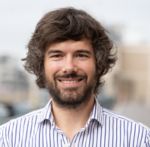
Thibaud
Boncourt

Thibaud Boncourt is Professor of Political Science at Université Jean Moulin Lyon 3 and Junior Fellow at the Institut Universitaire de France (IUF). He also co-leads the programme “Science, knowledge, and academic freedom” as part of the France-Quebec Research Chair on Contemporary Issues in Freedom of Expression. He earned his Ph.D. from Sciences Po Bordeaux in 2011 and has held research fellowships at the European University Institute, the Université libre de Bruxelles and the University of Cambridge. He also served as a Professor at Université Paris 1 Panthéon-Sorbonne for five years. His current research focuses on the politics of truth and academic freedom.

Juliette
Brown

Dr Juliette Brown is a consultant psychiatrist and an activist involved with Just Stop Oil, Defend Our Juries, Healthworkers for a Free Palestine, and Health for Extinction Rebellion. Dr Brown is among over 7,000 individuals arrested in the UK over the past decade for climate-related actions and is set to face trial for a second time in 2026 for her involvement in such activities.

Marion
Carré

Marion is the co-founder and president of Ask Mona, a company harnessing Al to improve access to culture. She collaborates with prestigious cultural institutions such as the Louvre, the Centre Pompidou, and the Colosseum in Rome. In addition, she serves as an expert for the European Commission, the French Ministry of Culture, and France 2030. Marion teaches courses on art and AI at Sciences Po and the Sorbonne, is a published author, and has been honoured with several awards for her work.

Elaine
Chew

Elaine Chew is a Professor of Engineering at King’s College London, with joint appointments in the Departments of Engineering and Cardiovascular Imaging. An operations researcher and pianist, she is a leader in music information research (MIR) and music perception, renowned for her work in modeling musical structures to explore music-heart-brain interactions and arrhythmia. As Principal Investigator of the European Research Council projects COSMOS and HEART.FM, she investigates music’s expressivity and its therapeutic potential for cardiovascular health.
Elaine Chew developed the “spiral array model” during her PhD at MIT, pioneering mathematical representations of tonality. She founded the Music Computation and Cognition Laboratory as an Assistant Professor at the University of Southern California and later led the Music, Performance, and Expressivity Laboratory at Queen Mary University of London. As a senior researcher at CNRS in France, she contributed to the STMS Laboratory and IRCAM. A concert pianist, Elaine Chew integrates research with performance, using mathematical visualisations to enhance her musical interpretations.
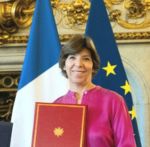
Catherine
Colonna

Catherine Colonna started her diplomatic career in 1983 at the French Embassy in Washington (1983-1986), then was responsible for European issues and economic law in the Legal Affairs Directorate at the Ministry of Foreign Affairs (1986-1988).
From 1988 to 1989, Catherine Colonna was an adviser in the Private Office of the Ministre d’Etat, Minister of Public Works and Housing, and from 1989 to 1990, a special assistant for European Affairs in the Policy Planning Centre at the Ministry of Foreign Affairs.
From 1990 to 1993, she was head of the Press Department in the Press, Information and Communication Directorate, then from 1993 to 1995, deputy spokesperson at the Ministry of Foreign Affairs.
From 1995 to 2004, she was spokesperson for the Presidency of the Republic.
From 2004 to 2005, she was director-general of the French National Centre for Cinematography (CNC) and vice-president of the Cannes Film Festival.
From 2005 to 2007, Catherine Colonna was Minister Delegate for European Affairs.
From 2008 to 2010, she was Permanent Delegate of France to UNESCO.
From 2010 to 2014, she worked as a managing partner in the Paris Office of the Brunswick Group.
From 2014 to 2017, Catherine Colonna was French Ambassador to Italy and San Marino.
From 2017 to 2019, she was the Permanent Representative of France to UNESCO.
From September 2019 to May 2022, Catherine Colonna was French Ambassador to the United Kingdom before being appointed Minister for Europe and Foreign Affairs from May 2022 to January 2024.
Catherine Colonna is an Officier of the Légion d’Honneur, Officier of the Ordre du Mérite, and Commandeur of the Ordre des Arts et Lettres. She was elevated to the rank of Ambassadrice de France in November 2020.

Alyssa
Gilbert

Alyssa Gilbert is the Director of Innovation at the Grantham Institute – Climate Change and the Environment at Imperial College London, where she leads Imperial’s climate change and sustainability innovation activities, connecting innovative students, staff, and alumni with opportunities to make a difference. She is the Director of Undaunted, a collaborative climate innovation activity between Imperial and the Royal Institution. Alyssa is the co-founder and co-chair of the UK Universities Climate Network and is a member of the One Planet Advisory Council. She is also co-convening a new Master’s programme on Cleantech Innovation, launched in 2024, designed to educate aspiring climate innovators and create revolutionary cleantech solutions.
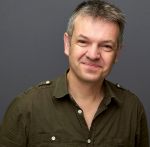
Graeme
Hayes

Graeme Hayes is a professor of Political Sociology at Aston University in Birmingham. His teaching and research focus on environmental protest, civil disobedience, and the criminal trials of activists involved in disruptive non-violent direct action. His most recent books are Breaking Laws: Violence and Civil Disobedience in Protest (2019, with Isabelle Sommier and Sylvie Ollitrault) and La Désobéissance civile. He is a former editor of the journals Environmental Politics and Social Movement Studies.

Sir John
Holmes

Sir John Holmes was educated at Preston Grammar School and Balliol College, Oxford. He joined the Foreign and Commonwealth Office in 1973 and served in a wide range of diplomatic roles in London, Moscow, Paris, New Delhi and Lisbon. In 1995, Sir John joined Prime Minister John Major in Downing Street as his Private Secretary (Overseas Affairs) and diplomatic adviser. He continued this role with Prime Minister Tony Blair from 1997 to 1999, becoming at the same time Principal Private Secretary. In 1999, Sir John was appointed as the British Ambassador in Lisbon, moving to Paris as Ambassador from 2001 to 2007. He then served as UN Under-Secretary-General for Humanitarian Affairs and Emergency Relief Coordinator (2007-10), before taking over the post of Director of the Ditchley Foundation (2010-16). He was Chair of the Electoral Commission from 2017 to 2021. He is currently a Trustee of the British Red Cross and of the Institut Francais in London, and Chair of the Humanitarian Memorial Committee.

Thomas
Jolly

Thomas Jolly is an actor and stage director. A graduate of the French National School of Theatre (TNB), he founded La Piccola Familia, staging works ranging from Marivaux to Shakespeare. His 18-hour staging of Shakespeare’s Henry VI trilogy, performed in full at the 2014 Avignon Festival, earned widespread acclaim and was followed by Richard III in 2022. Jolly has also directed opera, including Fantasio (2017) and Macbeth Underworld (2019), and revived the iconic musical Starmania in 2022.
Director of Le Quai Centre Dramatique National in Angers between 2020 and 2022, Jolly has also been an associate artist at major French institutions and teaches at national conservatories. Between 2022 and 2024, he worked on the opening and closing ceremonies of the Paris 2024 Olympic and Paralympic Games.
Credit: Anthony Dorfmann

Maria
Kulikovska

Maria Kulikovska is an artist, actionist-performer, researcher, and lecturer from Ukraine. She holds master’s degrees in Fine Arts from Kyiv’s National Academy, and Stockholm’s Konstfack University. Maria has previously worked as an architect in China and Switzerland. In 2015, she founded the international art group and open feminist art platform Flowers of Democracy. In 2022, Maria, along with her newborn baby, was forced to flee from Kyiv to Linz, Austria. From September 2022 to September 2023, she was based at the Helsinki International Artist Program (HIAP). She is currently working between Kyiv and London, and is undertaking PhD research in Leicester, UK. Maria Kulikovska was placed on the list of banned, “degenerative” artists in Russia due to her non-binary and politically charged art. She organised and performed numerous political actions and performances, participated in the various exhibitions, and has been nominated for several awards.

Sergiy
Lebedynskyy

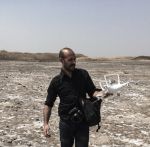
Emeric
Lhuisset

Researcher at Panthéon-Sorbonne University, Lhuisset graduated in arts from the École des Beaux-Arts de Paris and in geopolitics from the University Panthéon-Sorbonne / ENS d’Ulm. His work has been shown in numerous exhibitions, particularly at Tate Modern (UK), Museum Folkwang (DE), Institut du Monde Arabe (FR), Stedelijk Museum (NL), Sursock Museum (LB), Times Museum (CN), and Centre Pompidou (FR). In addition to his art practice, he has been teaching contemporary art and geopolitics at Sciences Po since 2007. He views his work as an artistic transcription of geopolitical analysis.

Rosalie
Mann

Rosalie Mann is the founding president of the No More Plastic Foundation, a leader in the field of sustainability. As co-creator of the No More Plastic Kids programme, she educates children worldwide about plastic pollution.
She established the Humann Prize, awarded for eco-conciousness under the auspices of the Cannes Film Festival. She also serves as an expert jury member on sustainability for the Institut Français de la Mode and Kering.
Mann has delivered talks at key events such as the UN World Ocean Day, Women’s Forum, and the French Ministry of Ecological Transition, where she addressed the critical challenges related to the International Treaty to End Plastic Pollution.
Her work has been featured in VOGUE, Le Monde, Les Échos, and National Geographic. Forbes named her one of the 40 most influential French woman of 2024.
In 2024, Rosalie Mann was honoured with the Silver Anthem Award as Nonprofit Leader of the Year for raising awareness about the health risks of plastic. She also lectures at leading universities, including Sciences Po and EDHEC.
She is the author of No More Plastic: How plastic harms our health, published in September 2024 by Editions La Plage.
Credit : Sylvia Galmot
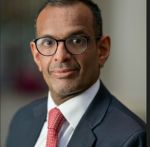
Anand
Menon

Anand Menon is the director of UK in a Changing Europe, an initiative funded by the Economic and Social Science Research Council that focuses on Brexit. He is also co-editor of the journal West European Politics. Menon has been a professor of European politics at both Birmingham and Oxford and has held visiting positions in New York and Brussels, amongst others. He is an associate fellow of Chatham House. Menon regularly contributes to major national newspapers and frequently appears on broadcast media.

Salomé
Saqué

Salomé Saqué is a French journalist specialising in climate change, youth issues, and gender inequality. After starting her career at Le Monde Diplomatique and France 24, she reported on the Yellow Vest movement for TV. In 2021, she joined the independent web media Blast to lead its economic section. She is also a regular commentator on France Inter and France 5.

Nabeelah
Shabbir

Nabeelah Shabbir is a British-Pakistani freelance journalist based in Amsterdam and the Deputy Director of Research at the ICJF. Her work focuses on disinformation, post-pandemic journalism, and online violence against women journalists. She has co-authored reports for the Reuters Institute on digital-born news media, innovation in the Global South, and the impact of the Panama Papers. For UNESCO and ICFJ, she co-authored The Chilling, a report on online abuse targeting women journalists. During her time at The Guardian, she was part of the award-wining “Keep it in the Ground” team, which earned a British Journalism Award in 2015. In 2008, she was named “European Young Journalist” of the year for her reporting in Kosovo.

Sunana

Sunana is a dynamic DJ and production duo known for their exhilarating and energetic stage performances.
The London-based collective, consisting of Sun and Ana, is regularly supported by some of the world’s top DJ’s, including David Guetta, Don Diablo, KSHMR, R3HAB, Hardwell, Nicky Romero, Lost Frequencies, and Steve Aoki.
With an impressive 25 years of combined experience, the duo has performed at hundreds venues worldwide, including events for some of the biggest stages today, such as Ministry of Sound, Pacha, Glastonbury Festival, and Wembley Arena.
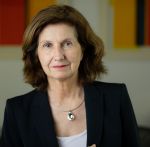
Hélène
Tréheux-Duchêne

Hélène Tréheux-Duchêne has been France’s Ambassador to the United Kingdom since 2022. After graduating from the Institute of Political Science , the Ecole Normale Supérieure and the Ecole Nationale d’Administration, she became a diplomat and was posted in Brussels at the Permanent Representation of France to the EU, but also in Geneva at the Permanent Representation of France to the UN. She has held positions in Paris, where she was notably Director of Strategic, Security and Disarmament Affairs (2013-2016) and Director-General of Administration and Modernization at the French Foreign Ministry (2019-2022). From 2016 to 2019, she was also Permanent Representative of France to the North Atlantic Council.

Pierre-Paul
Zalio

Pierre-Paul Zalio is a sociologist and University Professor who served as President of the École normale supérieure (ENS) Paris-Saclay from 2012 to 2022. Since then, he has held the position of President of Campus Condorcet. He was also a co-founder of the Université Paris-Saclay. A researcher at the “Institutions et dynamiques historiques de l’économie et de la société” research unit, he has conducted studies on family ownership, entrepreneurship, and the evolution of work. His notable publications include Grandes Familles de Marseille au XXe siècle. Enquête sur l’identité économique d’un territoire portuaire (Belin, 1999) and the Dictionnaire sociologique de l’entrepreneuriat (co-authored with Michel Grossetti and Pierre-Marie Chauvin, Presses de Sciences-po, 2014). He founded the journal terrains & travaux and serves on the editorial board of the Revue française de sociologie. A bronze medalist of the CNRS and honorary member of the Institut Universitaire de France, he has been a member of the Presidential Council for Science since December 2023.
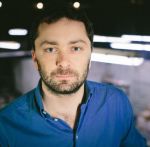
Alexander
Zeldin

Alexander Zeldin is a writer and director for theatre and film, working in both English and French. His work has been performed in 16 countries and presented at leading international arts festivals. His Inequalities Trilogy—comprising Beyond Caring (2014), LOVE (2016), which he adapted into a film (BBC and Cuba Pictures), and Faith, Hope and Charity (2019)—has earned international acclaim, receiving honours such as five Drama Desk nominations and the Arts Foundation Fellowship.
Recently, Zeldin wrote and directed The Confessions (2023) and The Other Place (2024), both in English. He has also created French-language works, including Une Mort Dans La Famille (2022), produced by Odéon-Théâtre de l’Europe in Paris, where he served as Associate Artist for four years. A French version of Beyond Caring, entitled Prendre Soin, is set to premiere at the Théâtre National de Strasbourg in Octobre 2025.
In 2019, Zeldin established his UK theatre company, A Zeldin Company, and in 2022, he founded Compagnie A Zeldin in France. His awards and nominations include the Quercus Trust Award, the Arts Foundation Fellowship, and seven Drama Desk Award nominations. He was made a Chevalier des Arts et des Lettres by the French Minister of Culture in 2024.
Credit: Alyssa Schukar
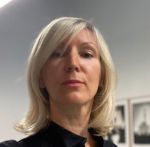
Alexandra
de Viveiros

Alexandra de Viveiros founded the Alexandra de Viveiros Gallery in Paris in 2016. Specialising in the Eastern European art scene, the gallery embraces the concept of nomadism, positioning itself in response to current socio-political issues. Since the beginning of the war in Ukraine, she has been actively involved in giving visibility to the artists of the Kharkiv School, whom she has represented since 2019.

Marie
Dumoulin

Marie Dumoulin is the director of the Wider Europe programme at the European Council on Foreign Relations (ECFR). She holds a PhD from Sciences Po Paris. Before joining ECFR, Dumoulin worked as a French career diplomat, holding several positions in French diplomatic missions abroad, including in Turkmenistan, Algeria, and Germany. She also worked with the Centre for Analysis and Planning (CAPS) and directed the Russia and Eastern Europe Department at the French Ministry of Foreign Affairs.

Natalia
Foresti

Natalia Foresti is Press Counsellor and Spokesperson at the French Embassy in the United Kingdom. Prior to this she was an adviser to the Spokesperson at the Ministry for Europe and Foreign Affairs, where she focused on strategic affairs, continental Europe and feminist diplomacy.

Eva
Jäger

Eva Jäger is curator of Arts Technologies at Serpentine gallery in London. She commissions artists working with advanced technologies and is a collaborator in teams designing novel approaches, workflows and philosophies of emerging tech. Most recently she curated The Call a project made in collaboration with the artists Holly Herndon and Mat Dryhurst. Eva is also part of the team working on Future Art Ecosystems as a researcher for the annual briefing (most recently Future Art Ecosystems Vol. 4: Art x Public AI). She is also a Co-Investigator of the Creative AI Lab (Serpentine R&D Platform and King’s College London).
Credit: Paul Gordon
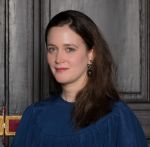
Anissia
Morel

Anissia Morel entered the French civil service in 2008 through the Ecole Nationale d’Administration. She joined the Conseil d’Etat, France’s Supreme Court for Administrative Affairs, gaining an extensive experience of judicial review (2010-2015). In parallel, she was regularly consulted as a legal adviser to the Ministry for Foreign Affairs, the Ministry of Defence and the Ministry for Culture. In 2015, Anissia was seconded to the UK Foreign Office as Senior Policy Planner covering Strategic Affairs, Russia, and Eastern Europe (2015-2017). She took up the post of Legal and Political Adviser at the French Embassy to the UK (2018-2022) before serving the French Foreign Secretary as UN, G7 and global affairs adviser. Anissia returned to the Conseil d’Etat in 2023 covering constitutional and home affairs. In February 2024, she began her current posting at director of the Institut français du Royaume-Uni & Counsellor for Culture and Cooperation at the French Embassy to the UK.

Aurélien
Saussay

Aurélien Saussay is an Assistant Professor of Environmental Economics at the London School of Economics, based at the Grantham Research Institute. He currently holds a Leverhulme Early Career Fellowship (2022-2025), and was a Visiting Scholar at Harvard Kennedy School during the Autumn Semester of 2024.
His research explores the interaction between economic inequality and climate change mitigation policies, with a particular focus on the employment impacts of the transition to Net Zero. He seeks to empirically estimate the effects of climate change mitigation on economic agents, with the aim of improving the design of decarbonisation policies.
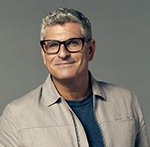
Jason
Solomons

Returning for the fourth time as our host for the Night of Ideas, Jason Solomons is a film critic for BBC Arts and The New European. He covers the BAFTAs and Oscars for BBC News, regularly appears as a commentator on Sky News and ITV, and curates the Cinedrome at the Green Man Festival. Jason hosts the Seen Any Good Films Lately? podcast and presents on Totally Wired Radio. He is the author of the best-seller Woody Allen: Film by Film, and is currently writing Movies: A Love Story.

Lisa
Vanhala

Lisa Vanhala is a Professor of Political Science at UCL. Her expertise lies in the politics of climate change, with a current focus on loss and damage, as well as the intersections of climate change and human rights. After completing her undergraduate studies at McGill University and Sciences Po Paris, she held positions at Oxford and LSE. She has also held visiting professorships in Paris, Florence, and Berkeley.

